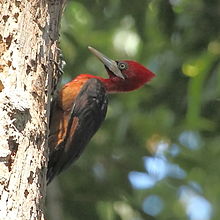Red-necked woodpecker
| Red-necked woodpecker | |
|---|---|

| |
| female at Alta Floresta, Mato Grosso state, Brazil | |
| Scientific classification | |
| Kingdom: | Animalia |
| Phylum: | Chordata |
| Class: | Aves |
| Order: | Piciformes |
| Family: | Picidae |
| Genus: | Campephilus |
| Species: | C. rubricollis
|
| Binomial name | |
| Campephilus rubricollis (Boddaert, 1783)
| |
The red-necked woodpecker (Campephilus rubricollis) is a species of bird in the family Picidae. It is found in Bolivia, Brazil, Colombia, Ecuador, French Guiana, Guyana, Peru, Suriname, and Venezuela. Its natural habitats are subtropical or tropical moist lowland forest and subtropical or tropical moist montane forest.
Taxonomy[]
The red-necked woodpecker was described by the French polymath Georges-Louis Leclerc, Comte de Buffon in 1780 in his Histoire Naturelle des Oiseaux from a specimen collected in Cayenne, French Guiana.[2] The bird was also illustrated in a hand-coloured plate engraved by François-Nicolas Martinet in the Planches Enluminées D'Histoire Naturelle which was produced under the supervision of Edme-Louis Daubenton to accompany Buffon's text.[3] Neither the plate caption nor Buffon's description included a scientific name, but in 1783 the Dutch naturalist Pieter Boddaert coined the binomial name Picus rubricollis in his catalogue of the Planches Enluminées.[4] The red-necked woodpecker is now placed in the genus Campephilus that was introduced by the English zoologist George Robert Gray in 1840.[5][6] The genus name combines the Ancient Greek kampē meaning "caterpillar" and philos meaning "loving". The specific epithet rubricollis combines the Latin ruber meaning "red" with -collis meaning "-necked".[7]
Three subspecies are recognised:[6]
- C. r. rubricollis (Boddaert, 1783) – eastern Colombia and eastern Ecuador through southern Venezuela, the Guianas and northern Brazil
- C. r. trachelopyrus (Malherbe, 1857) – eastern Peru, northern Bolivia and western Brazil
- C. r. olallae (Gyldenstolpe, 1945) – central and southwestern Brazil to central Bolivia
References[]
- ^ BirdLife International (2012). "Campephilus rubricollis". IUCN Red List of Threatened Species. 2012. Retrieved 26 November 2013.
- ^ Buffon, Georges-Louis Leclerc de (1780). "Le pic a cou rouge". Histoire Naturelle des Oiseaux (in French). Volume 13. Paris: De L'Imprimerie Royale. p. 80.
|volume=has extra text (help) - ^ Buffon, Georges-Louis Leclerc de; Martinet, François-Nicolas; Daubenton, Edme-Louis; Daubenton, Louis-Jean-Marie (1765–1783). "Grand pic hupé à tête rouge, de Cayenne". Planches Enluminées D'Histoire Naturelle. Volume 7. Paris: De L'Imprimerie Royale. Plate 612.
|volume=has extra text (help) - ^ Boddaert, Pieter (1783). Table des planches enluminéez d'histoire naturelle de M. D'Aubenton : avec les denominations de M.M. de Buffon, Brisson, Edwards, Linnaeus et Latham, precedé d'une notice des principaux ouvrages zoologiques enluminés (in French). Utrecht. p. 37, Number 612.
- ^ Gray, George Robert (1840). A List of the Genera of Birds : with an Indication of the Typical Species of Each Genus. London: R. and J.E. Taylor. p. 54.
- ^ Jump up to: a b Gill, Frank; Donsker, David, eds. (2019). "Woodpeckers". World Bird List Version 9.2. International Ornithologists' Union. Retrieved 10 August 2019.
- ^ Jobling, James A. (2010). The Helm Dictionary of Scientific Bird Names. London: Christopher Helm. pp. 87, 340. ISBN 978-1-4081-2501-4.
- IUCN Red List least concern species
- Campephilus
- Birds of the Amazon Basin
- Birds of the Guianas
- Birds described in 1783
- Birds of Brazil
- Woodpecker stubs
